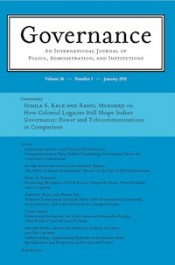Flinders on “What is governance?”
 Matthew Flinders of the University of Sheffield responds to Francis Fukuyama’s “What is governance?”. He argues that Fukuyama’s depoliticized and parsimonious approach risks eviscerating the core value and essence of this concept while also overlooking “the rule of rescue“:
Matthew Flinders of the University of Sheffield responds to Francis Fukuyama’s “What is governance?”. He argues that Fukuyama’s depoliticized and parsimonious approach risks eviscerating the core value and essence of this concept while also overlooking “the rule of rescue“:
Governance emerged as possibly the über-concept of the late twentieth century in order to capture an increasing sense of fluidity (economically, politically, socially, etc.). It is therefore hardly surprising that it remains an ‘essentially contested’ concept that is notoriously hard to pin down with any precision. In this context Francis Fukuyama’s What is Governance? provides an ambitious and timely attempt to develop the analytical leverage and traction of this almost ubiquitous concept. And yet the depoliticized and parsimonious approach adopted risks eviscerating the core value and essence of this concept.
There is little doubt that in order to impose some form of intellectual scaffolding around the concept that Fukuyama has clearly adopted a very narrow state-centric interpretation of the concept. This is an argument that has been made by a number of recent contributors to this debate but if anything there is a need to step back from such mid-range discussions and to broach the bigger macro-political questions concerning modern governance. Put slightly differently, Professor Fukuyama’s starting point definition of “a government’s ability to make and enforce rules, and to deliver services, regardless of whether that government is democratic or not” risks starting off down an intellectual cul-de-sac due to the manner in which it seeks to depoliticize the analysis of governance.
His rejection of Bo Rothstein’s warning that it is not so easy to separate governance as implementation from the normative ends that government is meant to serve is simply too easy – “once one starts to introduce substantive ends as criteria for good government, it is hard to know when to stop.” Such cutting and slicing may well facilitate interesting theories about the relationship between bureaucratic autonomy and institutional capacity, and it will certainly facilitate new epistemological positions and methodological tools, but will they actually tell us anything about what governance is and why it matters?
Governance as delivery via structured autonomy is too simple; not least where Prof. Fukuyama himself seems unable to resist the adjective “good” before any discussion of both government and governance in his initial position. His attempt to promote an empirical focus is therefore weakened by the existence of a subtle normative dynamic that exists between the words of each sentence and between the lines of each page. I have no problem with normative positions but let us bring them to the fore. In this regard it is interesting to note the author’s argument in The American Interest in which he writes,
I would argue that the quality of governance in the US tends to be low precisely because of a continuing tradition of Jacksonian populism. Americans with their democratic roots generally do not trust elite bureaucrats to the extent that the French, Germans, British, or Japanese have in years past. This distrust leads to micromanagement by Congress through proliferating rules and complex, self-contradictory legislative mandates which make poor quality governance a self-fulfilling prophecy. The US is thus caught in a low-level equilibrium trap, in which a hobbled bureaucracy validates everyone’s view that the government can’t do anything competently.
This, it would seem, is a position with both normative and empirical components that are inter-twined and not easily dissected.
Stepping back to engage with the basic questions about the politicized nature of public governance (i.e. why Americans “do not trust elite bureaucrats“) – questions that are not easily ignored – flows into a dynamic that resonates directly with Fukuyama’s emphasis on the link between capacity and autonomy. My argument here is simply this: Fukuyama’s logic is flawed by “the rule of rescue.”
The analysis of governance has – as Fukuyama’s article and a vast seam of scholarship on the “unraveling”, “unbundling” or “hollowing” of the state makes clear – emphasized the centrifugal logic of the modern management paradigm. To conceptualize a “sweet spot” at a grid reference between “high capacity” and “significant discretion” is therefore in line with a broadly neoliberal view of the state. Beyond the obvious questions - like how you define “capacity” or where the tipping point exists between “significant” and “excessive” discretion – is a more basic question about the “rule of rescue”. That is, the inevitable need for political institutions, political processes and politicians to intervene in times of crisis irrespective of formal models of bureaucratic autonomy or protestations about technocratic expertise.
‘Our moral response to the imminence of death demands that we rescue the doomed,” Albert Jonsen notes. “We throw a rope to the drowning, rush into burning buildings to snatch the entrapped, dispatch teams to search for the snowbound.” What Jonsen terms the “rescue mortality” is arguably synonymous with the compulsion politicians often feel to interfere or take back control over previous delegated services or depoliticized functions. The “logic of discipline” therefore encounters the straitened (political) confines of “the rule of rescue” (i.e. politicians cannot allow essential public services to fail) in a manner that confounds or at the very least complicates Fukuyama’s depoliticized answer to the question what is governance? A braver scholar might even dare to suggest that the true capacity of the state is best expressed in times of crisis when the inflexibilities of day-to-day governance are set aside. But that would not be “high capacity” via subordination in the form of “too many rules” but a quite different form of “crisis-driven capacity” in which politicians are directly involved but not through traditional bureaucratic processes.
If governance emerged as the über-concept of the late twentieth century then it is also possible to suggest that Francis Fukuyama emerged as a cosmopolitan über-scholar at around the same time. His first step along the path to generating a better response to the question of what is governance?’ has already fulfilled its intention to generate a wide-ranging debate. It is in exactly this context that this small contribution has sought to highlight a more politicized response to this question.
Matthew Flinders is Professor of Parliamentary Government & Governance at the University of Sheffield, United Kingdom. He is the author of Democratic Drift (2008), Walking Without Order (2009) The Oxford Handbook of British Politics (2010) and Defending Politics (2012) all Oxford University Press.
